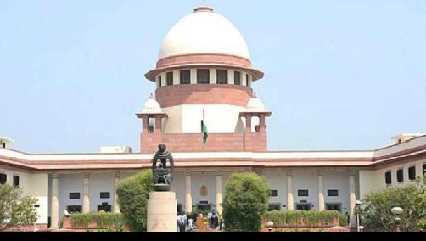
New Delhi, Apr 6 (PTI) The Supreme Court Wednesday said the government should always have the financial impact in mind while coming up with any scheme and referred to the Right to Education Act by observing that it is a classic example where a right has been created but where are the schools.
The observation was made by a bench headed by Justice U U Lalit which was hearing a plea seeking adequate infrastructure across the country for providing effective legal aid to women abused in matrimonial homes and creating shelter homes for them.
We would advise you and take it as unsolicited advice that whenever you come up with these kinds of schemes or ideas, always have the financial impact in mind....., the bench, also comprising Justices S R Bhat and P S Narasimha, said.
The bench told Additional Solicitor General (ASG) Aishwarya Bhati, who was appearing for the Centre, that the classic example is the Right to Education Act.
You have created a right. Where are the schools? So, therefore, the schools are to be put up by various authorities, including municipalities, state governments, etc. Where do they get the teachers? the top court said.
The bench observed that in some states, there are Shiksha Mitra and these persons are given about Rs 5,000 as against the regular payment.
It said when the court asks the state about it, they say there is a budget constraint.
One has to see this in totality, the bench observed, adding, Otherwise, it becomes lip service only.
At the outset, Bhati told the bench that they have circulated a letter seeking some time to place the details as directed by the court earlier.
The apex court had in February asked the Centre to file an affidavit giving details, including regarding the nature of central programmes/plans outlining assistance to support the efforts under the DV Act (Protection of Women from Domestic Violence Act, 2005) by various states, including the extent of funding, conditions of governing financial support and the control mechanisms in place.
During the hearing on Wednesday, the ASG told the bench that a lot of progress has happened .
The bench told the ASG that they can file a status report along with a note giving the details.
I can assure your lordships that substantial work has happened. There were a lot of parleys and consultations with all states. There was one conference held collectively with all states .., Bhati said, adding the Centre has to keep the states in the loop in the matter.
The bench said, That was the reason why we actually issued notice to the Central government only. We don't want multiplicity of grievances.
It observed that a new enactment is created and it is left to the states to implement the Act.
The state's resources may not match up to what you require. Without an assessment of the financial impact on the states, you create this. Once you created it, there are rights, the bench said.
It said normally, whenever any legislation is enacted, the financial impact of that is always assessed.
The bench also observed that in some states, revenue officers are working as protection officers in terms of the Act.
The court said it is a special law and requires a specialised kind of job for which different training is needed.
It said the Centre will have to get the data and make a statistical analysis as to what is the requirement in a particular state, how many shelter homes are there, and how many should be there looking at the kind of statistics.
The ASG said they can file a status report giving the additional details.
A letter has been circulated seeking more time to comply with the directions issued in the order dated February 25, 2022, the bench noted in its order.
It granted two weeks to the Centre to furnish the requisite information.
The bench said a status report be filed within two weeks and posted the matter for consideration on April 26.
In its February 25 order, the apex court had said the Centre should file an affidavit giving details or particulars, including the collection of state-wise relevant data of litigation under the DV Act concerning the complaints made, number of courts, and the relative number of protection officers.
It had also asked the Centre to give details about the desirable cadre structure and career progression for the protection officers.
The top court is seized of a plea filed by an organisation, "We The Women of India" seeking adequate infrastructure under the Protection of Women from Domestic Violence Act across the country for providing effective legal aid to women abused in matrimonial homes and creating shelter homes for them post lodging of complaints against husbands and in-laws.
The plea had said domestic violence continues to be the most common crime against women in India despite the Domestic Violence Act, 2005 coming into force more than 15 years back.
"As per the National Crime Records Bureau report for the year 2019, out of 4.05 lakh reported cases categorised under 'crimes against women, over 30 per cent were domestic violence cases," the plea has said.
Referring to findings of the National Family Health Survey, it has said about 86 per cent of the women victims of domestic violence never seek help.




